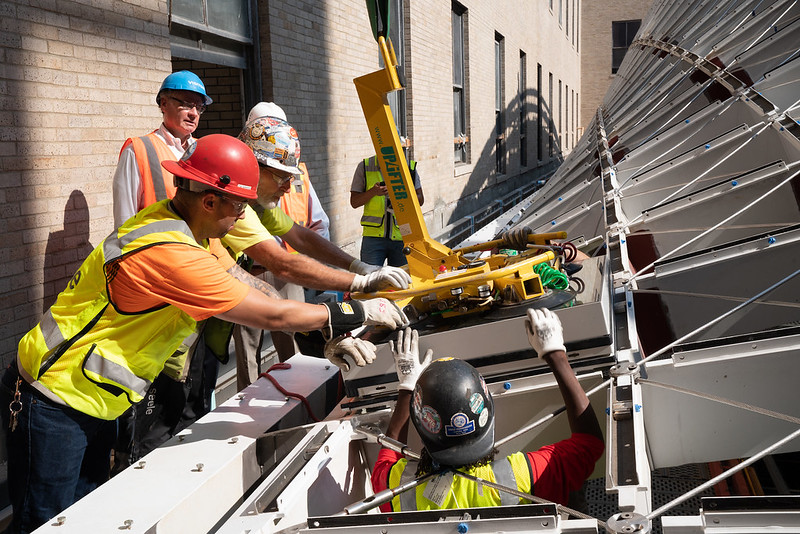
Construction workers (photo: governor's office)
I’m an employment attorney at Make the Road New York, a community-based organization that helps low-wage and immigrant workers fight workplace abuses. Among the hundreds of low-wage workers our team serves each year, construction workers make up the single largest group. We hear daily from construction workers cheated of their wages by subcontractors who refuse to pay overtime or disappear when a project is winding down, a problem that’s especially prevalent on the non-union and residential sites where many immigrant workers are employed, and frustratingly hard to combat under our current labor laws.
That’s why we urge Governor Cuomo to sign legislation that recently passed the State Legislature (A3350/S2766) that would help construction workers and countless other workers protect their rights and fight the pervasive pay abuses that plague New York’s construction industry.
What we’ve heard from our clients is, unfortunately, completely in-line with research on the prevalence of wage theft in low-wage jobs. A landmark study of wage theft in the U.S. found high violation rates among workers in the construction industry. Of the surveyed workers, 10.5% suffered a minimum wage violation. These rates were even higher in the residential construction industry, in which many of our members are employed: the residential sector, 12.7% of workers suffered a minimum wage violation in their previous week of work; 70.5% of workers who worked over 40 hours were denied the required overtime pay; 72.2% were not paid for “off-the-clock work” performed before and/or after their regularly scheduled shift; and 54.9% were denied meal breaks to which they were entitled. The study found that pay violations were even higher for workers paid in cash and paid by the day or week rather than the hour, as many of our clients are.
Compounding the high incidence of these wage violations, construction employers frequently try to escape accountability for their practices through abusive subcontracting schemes.
General contractors often contract with low-road subcontractors, retaining control over the worksite, wages, and working conditions while shifting only superficial employment duties over to their subcontractors. General contractors still call the shots and reap the benefits of the workers’ labor, but obscure their role in setting labor standards and deny legal responsibility for any violations.
Our system encourages these abuses. Subcontractors competing to win contracts engage in a race to the bottom by illegally depressing worker wages. Under the current employment law scheme, general contractors have little incentive to vet or monitor their employment practices. All too often, these subcontractors are not even legitimate businesses, but rather fly-by-night operations, labor brokers, or even just a worker who was told one day by their employer that they would now be responsible for handing out cash wages to their coworkers. Some subcontractors disappear overnight, leaving workers without their wages or any meaningful remedy.
Even when we are able to prove our construction worker clients’ claims, we often can’t find the employer by the time we bring the claim.
Attempting to hold a general construction contractor liable for wage violations that occur under their watch is an uphill battle under current law. In theory, we can prove that a general contractor is legally responsible even where one or more subcontractors were intermediaries. In practice, Department of Labor investigators, judges, and other decision-makers are extremely reluctant to hold general construction contractors legally liable for violations.
We need a new bright-line rule that recognizes the economic reality of subcontracting arrangements in the construction industry and gives workers a meaningful chance of recovering their wages. The bill passed by both the Assembly and Senate would do just that.
By making general contractors liable for any wage theft civil violations committed by any subcontractor on their job sites, the proposed law would give workers a much greater chance of recovering stolen wages, while also removing incentives for general contractors to use these abusive subcontracting schemes in the first place.
This reform is especially critical for low-wage immigrant workers employed on smaller projects with lower unionization rates. They are much less likely to have the resources to fight the abuses, and the most in need of this crucial law. It’s time to close this loophole and protect these vulnerable workers. The governor should sign this legislation into law today.
***
Sarah Leberstein is the Supervising Workplace Justice Attorney at Make the Road New York. On Twitter: @MakeTheRoadNY.
***
Have an op-ed idea or submission for Gotham Gazette? Email This email address is being protected from spambots. You need JavaScript enabled to view it.




